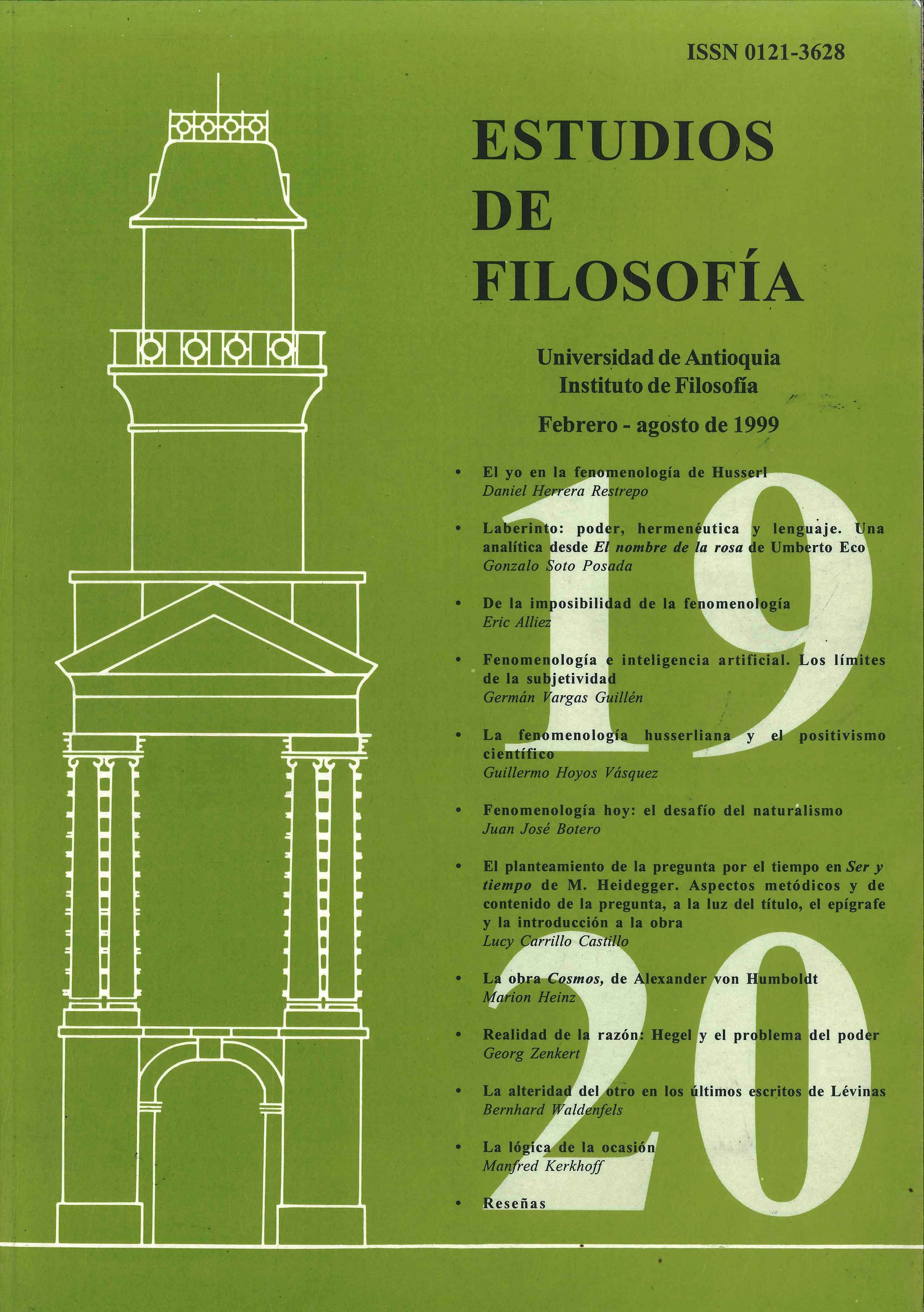La alteridad del otro en los últimos escritos de Lévinas
DOI:
https://doi.org/10.17533/udea.ef.336308Palabras clave:
sujeto, el otro, filosofía, humanidadesResumen
Emmanuel Lévinas es de los primeros críticos de un totalitarismo de la razón y de un centralismo del sujeto. Esto no significa que descarte la razón y se abandone a un irracionalismo; tampoco significa que el sujeto sea sentenciado a muerte; se trata más bien de un cambio de coordenadas del pensamiento tradicional, el cual es cuestionado por el otro, asunto fundamental en el presente artículo y en todo el pensamiento de Lévinas.
Descargas
Citas
FINK, E. Operative Begriffe in Husserl, in: Nähe und Distanz. Freiburg/München, 1976.
FOUCAULT, M. Les mots et les choses. Paris: 1966. Deutsch: Die Ordnung der Dinge. übersetzt von U. Koppen, Frankfurt am Main, 1971.
FREUD, S. Gesammelte Werke (Imago). London und Frankfurt am Main, 1940 ys.
GIULIANI, R. (Hrsg.). Merleau-Ponty und die Humanwissenschaften. München, 2000.
HEGEL, G. W. F. Werke in zwanzig Bänden. Redaktion E. Moldenhauer und K.M. Michel, Frankfurt am Main, 1970 y s.
HUSSERL, E. Cartesianische Meditationen (Hua I). Den Haag, 1950.
KAPUST, A. Berührung ohne Berührung. Ethik und Ontologie bei Merleau-Ponty und Lévinas. München, 1999.
MERLEAU-PONTY , M. La structure du comportement (1942), 1949. Deutsch.: Die Struktur des Verhaltens, eingeleitet und übersetzt von B. Waldenfels.
_____________ . Phénoménologie de la perception. Paris, 1945. Deutsch: Phänomenologie der Wahrnehmung, übersetzt von R. Boehm, Berlin, 1966.
__________ . Humanisme etterreur. Paris, 1947. Deutsch: Humanismus und Terror, übersetzt von E. Moldenhauer, Frankfurt am Main, 1966.
__________. Sens etnon-sens (1948), 1996. Deutsch: Sinn und Nicht-Sinn, übersetzt vonH.-D. Gondek, München, 1999.
__________ . Les aventures de la dialectique. Paris, 1955. Deutsch: Die Abenteuer der Dialektik, übersetzt von A. Schmidt und H. Schmitt, Frankfurt am Main, 1968.
__________ . Signes. Paris, 1960. Teilweise deutsch in: Das Auge und der Geist.
__________ . L ’ceil et l ’esprit. Paris, 1964 (= 1964 a). Deutsch in: Das Auge und der Geist.
__________ . Le visible et l ’invisible. Paris, 1964 (= 1964 b). Deutsch: Das Sichtbare und das Unsichtbare, übersetzt von R. Giuliani und B. Waldenfels, München, 1986.
__________. Laprose du monde. Paris, 1969. Deutsch: Die Prosa der Welt, übersetzt von R. Giuliani, München, 1984.
__________ . Vorlesungen I, übersetzt und herausgegeben von A. Métraux, Berlin, 1973.
_______________ . Das Auge und der Geist, übersetzt von H. W. Arndt. Hamburg, 1984.
_______________ . Merleau-Ponty ä la Sorbonne. Résumé de cours 1949-1952, Grenoble, 1988. Deutsch: Keime der Vernunft, herausgegeben von B. Waldenfels, übersetzt von A. Kapust, München, 1994. DOI: https://doi.org/10.30965/9783846729274
MÉTRAUX, A. y WALDENFELS, B. (Hrsg.), Leibhaftige Vernunft. Spuren von Merleau-Ponty Denken, München, 1986.
MEYER-DRAWE, K. Leiblichkeit und Sozialität. München, 1987.
PLÜGGE, H. Der Mensch und sein Leib. Tübingen, 1967.
SEEWALD, J. Leib und Symbol. München, 1999.
WALDENFELS, B. Phänomenologie in Frankreich. Frankfurt am Main, (1983). 1998.
________________. Antwortregister. Frankfurt am Main, 1994.
________________. Deutsch-Französische Gedankengänge. Frankfurt am Main, 1995.
________________. Sinnesschwellen. Studien zur Phänomenologie des Fremden. Bd. 3, FrankfurtamMain, 1999.
__________ . Metamorphosen des Cogito. Stichproben französischer Descartes- Lektüre, in: Das leibliche Selbst. Vorlesungen zur Phänomenologie des Leibes, herausgegeben von R. Giuliani (im Erscheinen).
Descargas
Publicado
Cómo citar
Número
Sección
Categorías
Licencia
Derechos de autor 1999 Bemhard Waldenfels, Guillermo Hoyos Vásquez

Esta obra está bajo una licencia internacional Creative Commons Atribución-NoComercial-CompartirIgual 4.0.
Los autores que publican en Estudios de Filosofía acuerdan los siguientes términos:
1. El Autor retiene el copyright del "Artículo", por el cual se entiende todos los objetos digitales que pueden resultar de la subsiguiente publicación o distribución electrónica.
2. En conformidad con los términos de este acuerdo, el autor garantizará a Estudios de Filosofía como Editor el derecho de la primera publicación del artículo.
3. El Autor le concederá al Editor un derecho perpetuo y no-exclusivo, así como una licencia de la misma clase, de publicar, archivar y hacer accesible el Artículo parcial o totalmente en todos los medios conocidos o por conocerse, derecho y licencia que se conocen como Creative Commons License Deed. Atribución-No Comercial- Compartir igual CC BY-NC-SA o su equivalente que para efectos de eliminar toda duda, le permite a otros copiar, distribuir, y transmitir el Artículo bajo las siguientes condiciones: (a) Atribución: Se deben reconocer los créditos de la obra de la manera especificada por el Autor a Estudios de Filosofía, pero no de una manera que sugiera que tiene su apoyo o que apoyan el uso que hace de su obra. (b) No Comercial: No se puede utilizar el Artículo para fines comerciales.
4. El Autor puede realizar otros acuerdos contractuales no comerciales para la distribución no exclusiva de la versión publicada del Artículo (v. gr. ponerlo en un repositorio institucional o publicarlo en un libro) con la condición de que haga el debido reconocimiento de su publicación original en Estudios de Filosofía.
5. A los Autores se les permite y Estudios de Filosofía promueve publicar en línea (online) la versión pre-impresa del Artículo en repositorios institucionales o en sus páginas web, antes y durante la publicación, por cuanto que puede producir intercambios académicos productivos, así como una mayor citación del Artículo publicado (ver The Effect of Open Access). Dicha publicación durante el proceso de producción y en la publicación del Artículo se espera que se actualice al momento de salir la versión final, incluyendo una referencia a la URL de Estudios de Filosofía.















